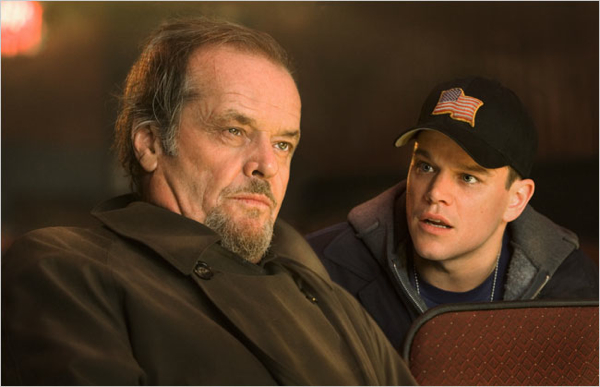Movie review by Greg Carlson
Trust Martin Scorsese to deliver the goods even when the picture he’s serving on a silver platter is a remake of a Hong Kong mole movie with a tantalizingly preposterous premise. Massive suspension of disbelief is required to buy a set-up in which a mobster grooms an underling to infiltrate the police department even as an undercover cop manages to breach the same mobster’s own inner circle. Think about it too much and the whole thing collapses like a house of cards, but buckle up for the ride and “The Departed” is likely to stick to your ribs a whole lot longer than “The Aviator” and “Gangs of New York.”
With this welcome abandonment of overlong, fussy period pieces, critics have strained their keyboards trying to come up with ways to bear-hug Scorsese, the potentate of contemporary American gangster cinema, the first two “Godfather” movies notwithstanding. While “The Departed” is no “GoodFellas,” it is one of the veteran filmmaker’s strongest theatrical features in years, in no small part due to a rollicking screenplay by William Monahan, who serves up heaps of delicious dialogue to counterbalance the snaky turns of the convoluted plotting.
While Scorsese’s trademark craftsmanship, abetted by longtime collaborators like DP Michael Ballhaus and editor Thelma Schoonmaker, works like crazy glue, an armful of colorful star turns further stacks the deck. Leonardo DiCaprio, making his third feature with Scorsese, is at last well-suited for the role in which he is cast. Matt Damon is comfortable on the familiar turf of the movie’s Boston setting, and he’s got the authentic-sounding accent to prove it. The flashiest role, however, belongs to Jack Nicholson, whose deviant thug Frank Costello marks another standout character in the great performer’s impressive arsenal. Costello’s voracious appetite for sex and violence laces the film with a lethal combination of humor and menace. Squeamish viewers should be warned: “The Departed” has more head shots than a modeling agency file cabinet.
Filled with quicksilver exchanges, Monahan’s script trades in beautifully crafted put-downs and wonderfully vulgar insults. Nicholson, Alec Baldwin, and especially Mark Wahlberg, who nimbly steals all the scenes in which he appears, are the chief beneficiaries of Monahan’s gift of gab. The script ripples with hilarious, foul-mouthed taunts, often delivered so rapidly that great lines are buried by even better ones. Occasionally, Scorsese is unable to corral Nicholson, but honestly, who cares? Nicholson’s Costello is such a juicy role, you can practically see the electrical charges whenever he appears on the screen.
For Scorsese fanatics keeping score, “The Departed” is not without noticeable flaws. Linking the two double-agents through a love triangle with Vera Farmiga’s shrink is a strategy that doesn’t pay off (and didn’t exist in the original “Infernal Affairs”). Also, at two and a half hours, “The Departed” nearly overstays its welcome. The story threads need so much attention that elements of character, especially the relationship between Costello and Damon’s Colin Sullivan, are merely implied when they should be fleshier. Even so, “The Departed” only strikes a few sour notes. The vast majority of Scorsese’s latest composition provides the cinematic equivalent of soaring arias and dazzling guitar solos.
